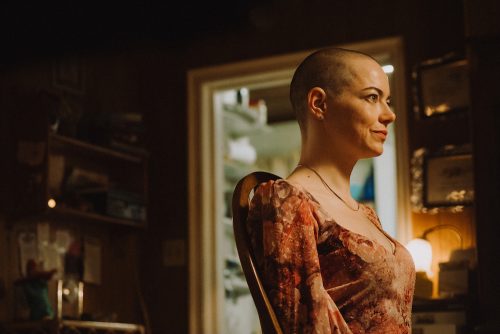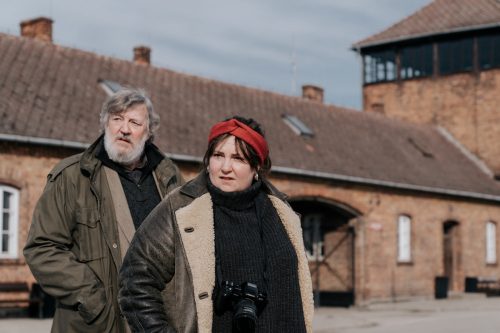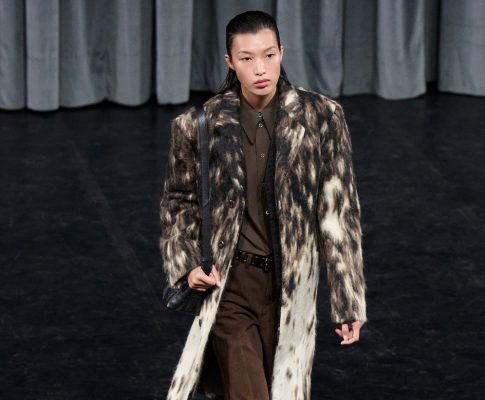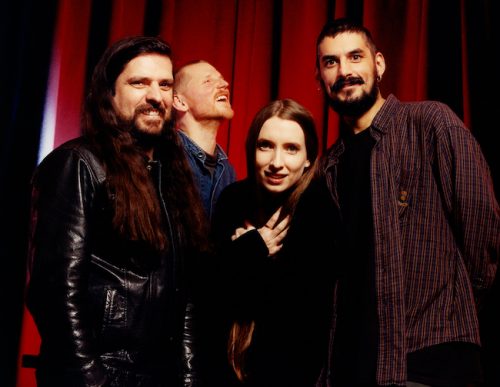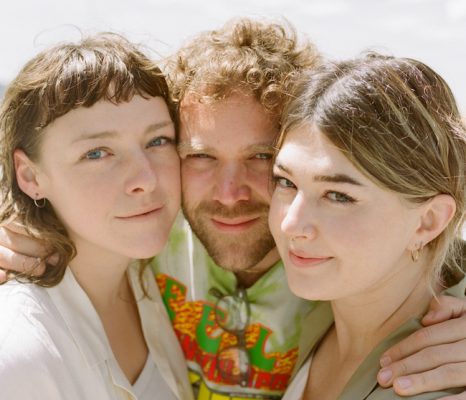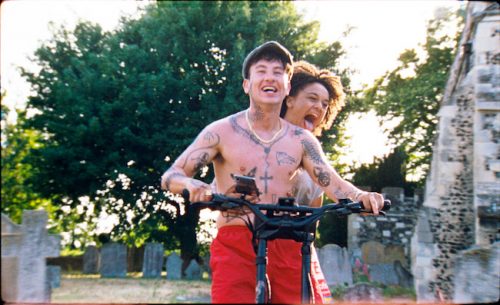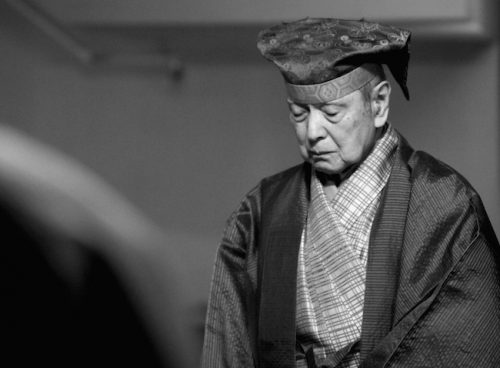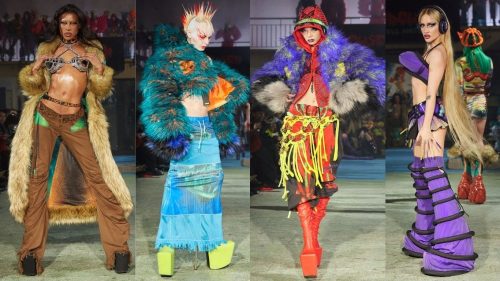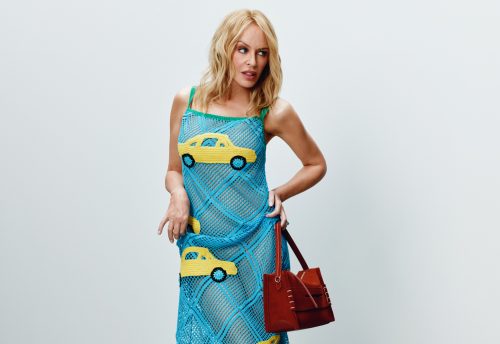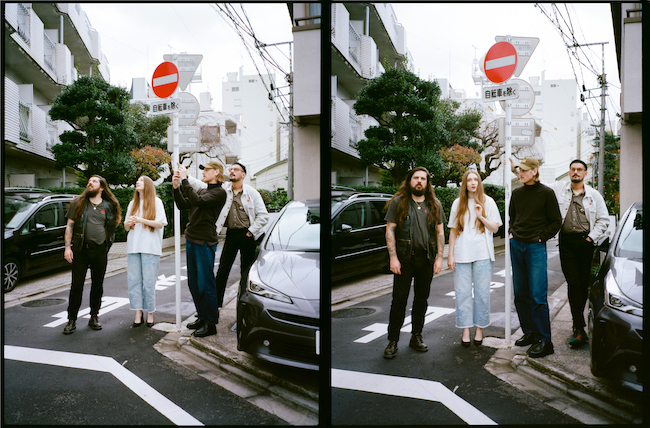
―― You might have been asked this question a lot, but why does your music include so many food references?
Nick: The band revolves around food.
Florence: That was something that I didn’t notice until we did interviews. People would bring it up and it would be a total surprise to me. I never realized how often I mention food in my lyrics. I’m surprised that it is unusual.
Lewis: Yea, what else are you thinking about guys?
Florence: I am always surprised at how unusual it is. I think about food a lot. I get very grumpy when I am hungry and feel stressed out when I don’t have meals at the same time every day. If I skip a meal I find it very difficult to think about anything else. It’s like a structure thing that I like. I must just be preoccupied with food. Food can be really funny as well. I like funny food. There is ham you can get in the UK called Billy Bear Ham. It’s like meat squashed into the shape of a bear’s face. I don’t know what it’s made of, supposed to be meat. Things like that I find funny.
Lewis: We talk about food a lot. On the way here we were talking about food.
Tom: When we started, food was what we did more than play music. It started as a social thing originally. We used to hang out and write music and eat food.
―― In your press release, there is a photo of you eating together. Do you think those moments inspire you? Do you talk about music during your meals?
Nick: I think it’s the best time to forget about music.
Tom: When you are eating there is a communal or ritual aspect. Certainly, if any ideas are going on, they are subconscious. That’s a really valuable thing to do because you can be together and you are kind of writing, everything is going on in the back of your head. If you wrote something or jam to something, it’s percolating in the back of your head and it gives you something else. You are not sitting there thinking about writing, you are thinking about “This turkey sandwich is pretty good”.
Florence: We did those press shots and found it funny because we talked about food things and it’s such a theme that Dry cleaning loves food. I mean everybody else eats food so I thought it was a bit of a joke. I was eating food and that’s our thing.
Tom: We are endorsed by supermarkets.
―― How would you explain ‘Dry Cleaning’ from the perspective of food? Do you think how you make music is related to how you prepare food or what you like?
Florence: My favourite way to cook is to make something from what is in the fridge.
Lewis: Mine is the complete opposite. For me, cooking is about shopping.
Florence: I don’t like recipes that much. I feel that I am being told what to do. I like the risk of “this could be disgusting” but hopefully it’s the opposite.
Lewis: I love going to the shop and getting all the ingredients. I have to have a recipe.
―― Food isn’t just about eating. It is also about the relationship with it as an object. We can feel that through your music for Dry Cleaning as well.
Florence: I am always keen to hear what other people make of it. Cause I’m unaware of the role it has in writing. It’s a subconscious thing so that’s interesting. Somebody else was saying to me the other day, that it was a female voice talking about food. I never thought of that either. There is a vaguely political slot to it that I don’t know. I almost don’t have an opinion about this and I’m interested in what people make out of it.

―― For your new album, you worked with John Parish again. You said you had more time in the studio to do experimentation. What was happening in these studio sessions?
Nick: It’s a funny thing, we use the term experimentation a lot to describe our time in the studio.
Tom: It’s quite a subjective term. What experimenting to you doesn’t necessarily mean experimenting to us.
Nick: Experimenting is like scientific and it means keeping everything the same and changing one thing. We are more like an exploration I think.
Tom: It’s almost like experimenting with our sound, like adding instruments using different chords. We put different effects on them and made pedal changes and tried stuff.
Nick: It’s that element of having that extra time that allows us to do all that things. It has a mental effect, the idea of going to that studio, Rockfield, and working with John had an element of being comfortable and we try to push ourselves in certain ways. There was an element underneath that of trust where we knew who was working with, the engineers, the producers in the same very isolated environment. In the same room, working in the same studio, eating all the same foods. Because you have this extra time the anxiety is just not there. It could have been there previously where we had to make an album in two weeks, and we have a month this time. I won’t go too much into detail but there were so many challenging things within that but the default setting of being there, who we were with, putting all that anxiety in the back of my head. Which is cool. I benefit a lot from it.
Lewis: Physically we gave ourselves a lot of playrooms. It’s about the mixture between the live room where we recorded everything and the room behind it which was like a toy room; the keyboards, percussions, saxophones and instruments were everywhere. We would dip in a little bit and start playing. I think the weather made it different too. In the first record, it was nice, we spent a lot of time outside playing table tennis. This time it was a bit cold and rainy, we spent a lot of time inside. We should have brought the next album in the winter.
―― What were some of the new ideas, tastes or sounds you wanted in this new album?
Lewis: I think there is an emphasis on space. We were trying to look for ways to find more space. The opposite of that is to make things shorter, and straightforward. So, there are shorter single-type things and longer, more expansive things. It’s about pushing those extremes and trying to make the Dry Cleaning world more dynamic.
Florence: The more I am thinking about it, the ways we are experimenting were quite small, like the recorder or getting somebody to play horns. A different band would have been like let’s get sixteen people to play horns. The things we did were quite modest in a way but I think that has to do with the general temperament of the band. We are not really like maximalists so they were quite thoughtful small additions. The reason why we didn’t do things like that was just time but maybe we felt like we had the right. We were on an intimate scale.
―― In terms of exploration, do you have a song on the new album that you felt went well?
Everyone: So many.
Tom: That is a good example as well. That wasn’t productive time, it was a productive lack of time. We had the first bit pretty settled and John told us to go do the second bit. He told Nick to play the bass drum with a felt beater and told Louis and me to just go do something before lunch. It was just that this change of pace was pretty normal so we were just doing stuff. We were just running stuff through pedals and trying whatever but we were thinking about lunch. So when we walked out it was a surprise to us that everyone else thought it was good. Sometimes we judge things too quickly and it stops us to get interested in them. If you can suspend judgement on something you might get something interesting.
Florence: One thing we talked about, that we didn’t do, but should do was to get a children’s choir. You could expect a children’s choir in the next album.
―― The last part of “Conservative Hell” was very striking. The lyrics, in the beginning, reminded me of your previous song ‘Magic of Megan’. These are discussions about the roles of women and their position in society. Can you tell us about the background of this song?
Florence: Originally I wrote a note somewhere that I wanted to write a lyric like “Conservative Hell”. It’s probably the wake of something dreadful happening in the UK, to be honest. We’ve had a conservative government for more than a decade. They are always doing new awful things every week so it’s been on my mind. We were writing so I wanted to write something on this subject as ‘Conservative Hell’. I was trying to think of something more clever for ages, but in the end, I came back to the note because I thought it was quite funny. It sounds sort of like a tabloid headline. Instead of being very UK-centric, it was about the whole world being in a ‘Conservative Hell’ at this moment. It was around the time Marine Le Pen nearly won the elections for France and that’s why it came to my mind.
I also wanted to get out the idea that more right-wing governments are taking over Europe and the world but life goes on. It sort of enters your frame of reference now and then. There is something awful about having no choice yet having to carry on shopping and going to people’s weddings with a dreadful political backdrop.
So I was touching on police powers and the idea of “if you think this caused it, you should try not to with the driver”. This was a bumper sticker of someone cooking at Rockfield. It struck me about the people in charge of the country. The people in the government are the drivers, they are in charge. It’s like the UK’s rubbish but they are sort of worse. Since I was thinking about this, normal bumper stickers start to relate in my mind. That’s how I collect it all together.
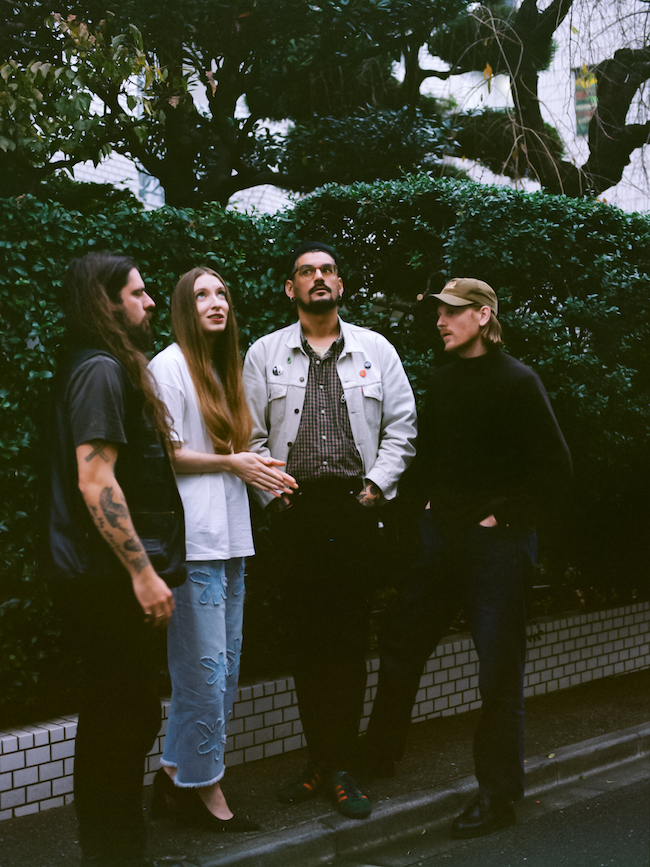
―― Do you often have discussions about political issues over food? You did mention that you don’t think about music when eating.
Florence: It inevitably does. There are always new terrible terms. Particularly in the moment about people coming across the channel with boats. It’s a constant unfolding of disaster. There is a detention centre called ‘Manston’ in Kent.
Tom: Someone drove up to it and petrol-bombed it and killed themselves. The bomb wasn’t very successful but it did happen. It’s just a symptom of the media and the government allowing anti-migrant behaviour that people are attacking migrants. They are using the word ‘Migrant’ instead of ‘Asylum seekers’ where they are playing a legal trick. People are allowed to claim asylum due to Democracy but there is no legal way to cross the channel to be in England to claim it.
Florence: A lot of people in the UK have been made to believe that it is illegal to cross the channel to claim asylum but it is not. It is a legitimate way to do it. The narrative has been completely taken away.
Tom: There is also a double negative because the number of Asylum seekers has been going up since we have interwoven to help people in Ukraine and Hong Kong. However, we don’t extend the same things to Serians or people from war-torn countries even though we had a hand in those conflicts. We have a responsibility to those people but because we don’t speak the same language and racism uncomfortable things are happening in the UK. If you can see past the media it’s very ugly.
Florence: It’s very blatant as well. It’s impossible to ignore even if you wanted to. There are big stories every other week where something uncontrollable happens.
Tom: I mean the same thing that happened to Seria is happening in Ukraine. The response for both of those conflicts is completely different.
―― Can you explain how the song “Liberty Log” was written? There was an interesting phrase where you used the terms, ‘I will risk slow death for Chinese Spring roll’ and ‘Huge rotten football’. What was the idea behind that?
Nick: I’ve got recordings on my phone of when we rehearsed two winters ago under a railway arch. When railways were built in Victorian times, they were built elevated. These arches are now repurposed all over London. One of our friends has a venue and since it was shut during the pandemic we rehearsed there. The trains going over the top were loud and it was beyond freezing. The song first came out there but it went away and came around again throughout our writing period. Tom’s got a four-track tape recorder you record on a cassette tape. We have done quite a lot of work on it previously. Tom made some nice guitar loops on it and we were using it during the performance as the song was fading in different sounds to build up as a background layer. We used that on recording for Rockfield. It’s kind of a jam. We haven’t played it that much and it has three sections but they were quite indeterminant and had no set length. I was quite apprehensive about recording it because there was so much uncertainty. A lot of the time we work the anxiety out of those songs by setting them into stone but this one is very much an improvisation in many ways. We did it in one take and that’s what you hear on the record so I am very happy about that. We haven’t played it live yet because we haven’t had a lot of rehearsal time. We hope we have it ready for this tour. Everyone loves it and it’s one of my favourite songs.
Florence: The lyrics, ‘Liberty Logs’ came from the ‘Spring roll’. During the lockdown, you couldn’t go to restaurants and it was week 9. I was already going crazy but I was on a new level of madness. I was thinking about how much I wanted a spring roll. It was the pre-vaccine period when people were dying of covid and no one understood how it worked or who was at risk. There were a lot of discussions on if takeaways were safe or not and it was on BBC news. I remember I spent so much time thinking if I could get a takeaway or not and being too afraid to get one but I wanted to risk it anyway. The amount that I wanted was beyond my fear of getting covid.

photography Marisa Suda(https://www.instagram.com/marisatakesokphotos/)
text Junnosuke Amai(TW)
